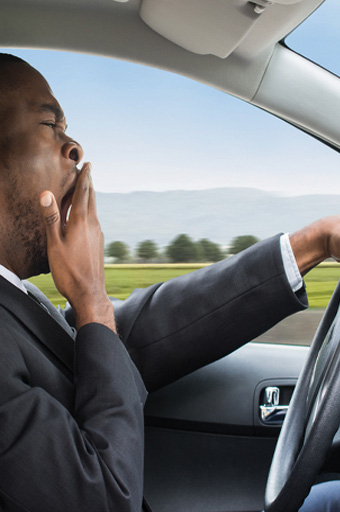Driving drowsy should not be a part of your road trip
Driving drowsy should not be a part of your road trip
Sleep: It helps keep you alert and ready to take action, which are two essential components for safe drivers.
According to the National Highway Traffic Safety Administration, car crashes caused by drowsy drivers happen because: 1. A driver falls asleep, and he or she runs off the road or into another car or object; 2. A drowsy driver is less attentive and has slower reaction times for breaking or steering. In fact, if a person goes for 24 hours without sleep, it’s the equivalent of having a blood alcohol content of 0.10%.
It should go without saying, but if you’re tired, don’t drive. Once you’re on the road, if you do get sleepy, get yourself a jolt of caffeine—but even better pull off the road (when it is safe to do so, a rest area is best), and nap for 15-30 minutes. The only true cure for drowsiness is sleep, so minimize the chances of drowsy driving by planning your trip accordingly. Also, try not to travel alone—a companion can help you stay alert.
But, what about the drivers around you?
Stay alert and give a wide berth to drivers who are behaving recklessly. Notify the police (from your hands-free device) if you think a driver is truly a danger.
Our agency can help you protect you and your car. We can review your auto insurance policy to help you make sure you have enough auto coverage, including: collision insurance, which will cover your vehicle if it is involved in a collision with another vehicle or stationary object. Additionally, we can look at your liability coverage to help you pay for property damage and/or injuries to another person.
Don’t forget about uninsured/supplemental underinsured motorist insurance. While your personal injury protection (no-fault) coverage will protect you and the people in your car for medical bills, lost wages, and pain and suffering—regardless of who is at-fault for the accident—UM/SUM will provide coverage if the injuries are serious, or if the other driver is at-fault, and he or she either doesn’t have insurance or if his or her limits are low and he or she cannot pay when the injured party sues.








Leave a Reply
Want to join the discussion?Feel free to contribute!